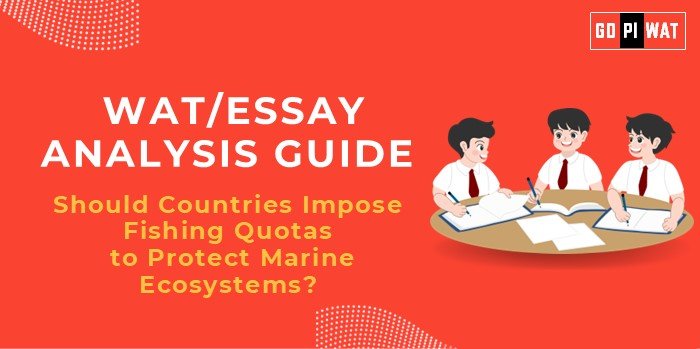📋 Written Ability Test (WAT) / Essay Analysis Guide: Should Countries Impose Fishing Quotas to Protect Marine Ecosystems?
🌐 Understanding the Topic’s Importance
Fishing quotas bridge ecological sustainability and economic livelihoods, making it a critical discussion for B-schools focusing on sustainability, governance, and innovation.
📝 Effective Planning and Writing
- Time Allocation:
- Planning: 5 minutes
- Writing: 20 minutes
- Review: 5 minutes
- Structure:
- Introduction: 60 words
- Body: 350 words
- Conclusion: 60 words
💡 Introduction Techniques for Essays
- Contrast Approach: “While fishing fuels economies, over 30% of global stocks are overexploited, raising urgent questions about sustainability.”
- Solution-Based: “Fishing quotas offer a proven path to reconcile economic needs with ecological sustainability.”
- Timeline-Based: “From Iceland’s quota success in the 1980s to the EU’s policies today, fishing quotas have shaped marine conservation efforts.”
📖 Structuring the Essay Body
- Achievements:
- 📈 Use data to highlight recovery in stocks and ecosystem health.
- Challenges:
- 💸 Mention enforcement costs and socio-economic impacts.
- Future Outlook:
- 🌍 Discuss opportunities with technology and global collaboration.
✨ Concluding Effectively
- Balanced Conclusion: “While fishing quotas are not without challenges, their role in securing marine ecosystems and economies makes them indispensable.”
- Global Example Conclusion: “As nations like Iceland demonstrate, fishing quotas can deliver sustainability and economic growth when backed by strong governance.”
📄 Sample Short Essays
- Balanced Perspective: “Fishing quotas are essential for marine health but require inclusive frameworks to ensure equitable impact on small-scale fishers.”
- Solution-Oriented: “Investing in enforcement technology and community participation can maximize the benefits of fishing quotas.”
- Global Comparison: “Learning from Iceland and the EU, countries can implement scalable quota systems tailored to their socio-economic contexts.”


